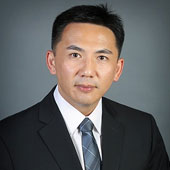Aghogho Edevbie
Aghogho Edevbie currently serves as Michigan’s Deputy Secretary of State. Before Secretary Benson appointed him in March 2023, he was the Michigan State Director of All Voting is Local. Aghogho has played a crucial role for more than a decade in protecting voters through his advocacy for ballot drop boxes, early voting, increased funding for clerks, and protections for election workers. During the 2022 election cycle, Aghogho served on the drafting committee for the successful voting rights Proposal 2 ballot initiative, which amended Michigan’s Constitution. A Detroit native, Aghogho has a bachelor’s degree in political science from the University of Michigan and a juris doctorate from the University of Michigan Law School.
Esther (Essie) Wagner
Essie Wagner is the Director of the Office of Behavioral Safety Research in NHTSA’s Office of Program Development and Delivery. Her office is responsible for studying how to change behavior to improve traffic safety outcomes. Through the years, Essie developed expertise in the areas of safe systems, older drivers, and pedestrian safety issues. Prior to joining NHTSA 26 years ago, she worked at the Federal Highway Administration’s Turner Fairbank Highway Research Center doing human factors safety and driving simulator research. Essie earned a Master of Arts degree in Human Factors Psychology from George Mason University in Fairfax, Virginia and a Bachelor of Arts degree in Psychology from The College of Wooster in Wooster, Ohio. Her two children are awesome. She lives in Arlington, Virginia with her husband (Jamey).
Jessica Cicchino
Jessica Cicchino is senior vice president for research at the Insurance Institute for Highway Safety, where she oversees the Institute’s work on driver behavior, human factors, and roadway infrastructure. She is the author of over 75 peer-reviewed papers on topics such as distracted driving, speed, pedestrian safety, crash avoidance technology and driving automation. Prior to joining the Institute as a research scientist in 2012, Dr. Cicchino worked as a research psychologist at the National Highway Traffic Safety Administration. She received a PhD in psychology from Carnegie Mellon University and a bachelor’s degree in cognitive science from Vassar College.
Steve Kiefer
Steve Kiefer is the founder of The Kiefer Foundation whose mission is to end distracted driving and all associated traffic deaths and injuries. The Kiefer Foundation was established in 2016, in honor of his son Mitchel Kiefer, who was tragically killed by a distracted driver on September 19th, 2016. In July 2018, Kiefer received the Distinguished Service Citation from the Automotive Hall of Fame honoring the work he has done to end distracted driving through the Kiefer Foundation.
Kiefer recently retired from General Motors, after nearly 40 years of experience in the automotive industry, including leadership positions in major markets around the world. Kiefer’s most recent position was President, GM International, a position he has held since November 2019. Kiefer was a member of the GM Senior Leadership Team. In this role, he was responsible for GM operations outside of North America and China. His mandate was to deliver profitable growth in the 60+ international markets in which GM competes.
Prior to this role Kiefer spent five years as Senior Vice President, Global Purchasing and Supply Chain, where he delivered $2B of annual cost reductions for 5 consecutive years, while significantly improving supplier relationships. Kiefer joined GM in September 2013 as Vice President, Global Powertrain, after more than a decade of senior leadership roles with the automotive supplier Delphi.
Kiefer has deep cross functional expertise in all areas of the automotive business, including engineering, sales, purchasing, supply chain, operations, finance, government relations, corporate strategy and general business management. Throughout his career, Kiefer has focused on product innovation to drive customer value and profitable growth.
Kiefer is a member of the Michigan Governor’s Traffic Safety Advisory Commission and the Michigan State University College of Engineering Alumni Association Board. He was GM’s key executive at Michigan State University and previously served as a member of the Berkeley Engineering Advisory Board, the Supervisory Board of Adam Opel AG in Germany and the board of directors of United Way for Southeastern Michigan.
Kiefer received a master’s degree in business administration from the University of Michigan. He earned a bachelor’s degree in mechanical engineering from Michigan State University, which included engineering studies at RWTH Aachen University in Germany.

![]()


